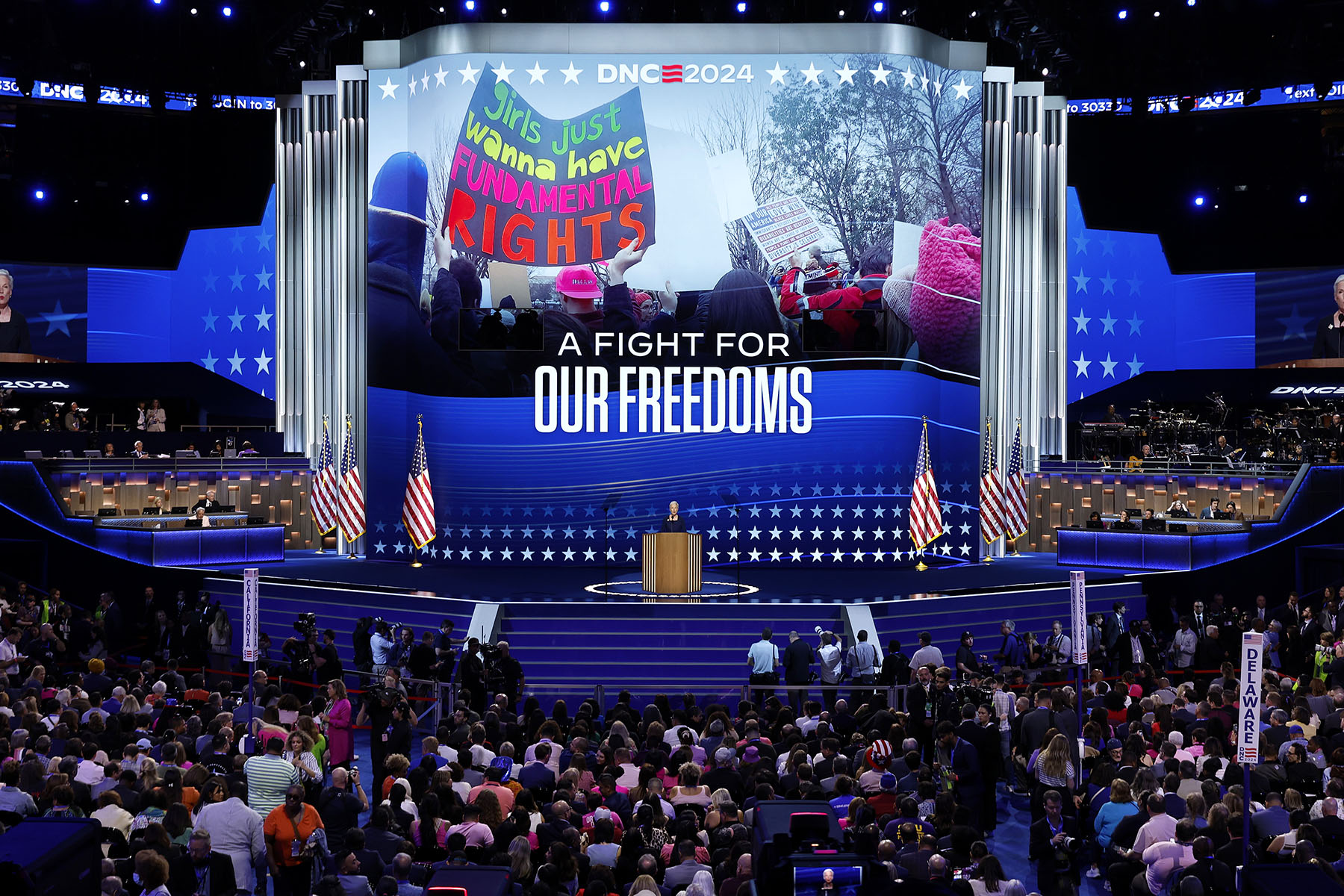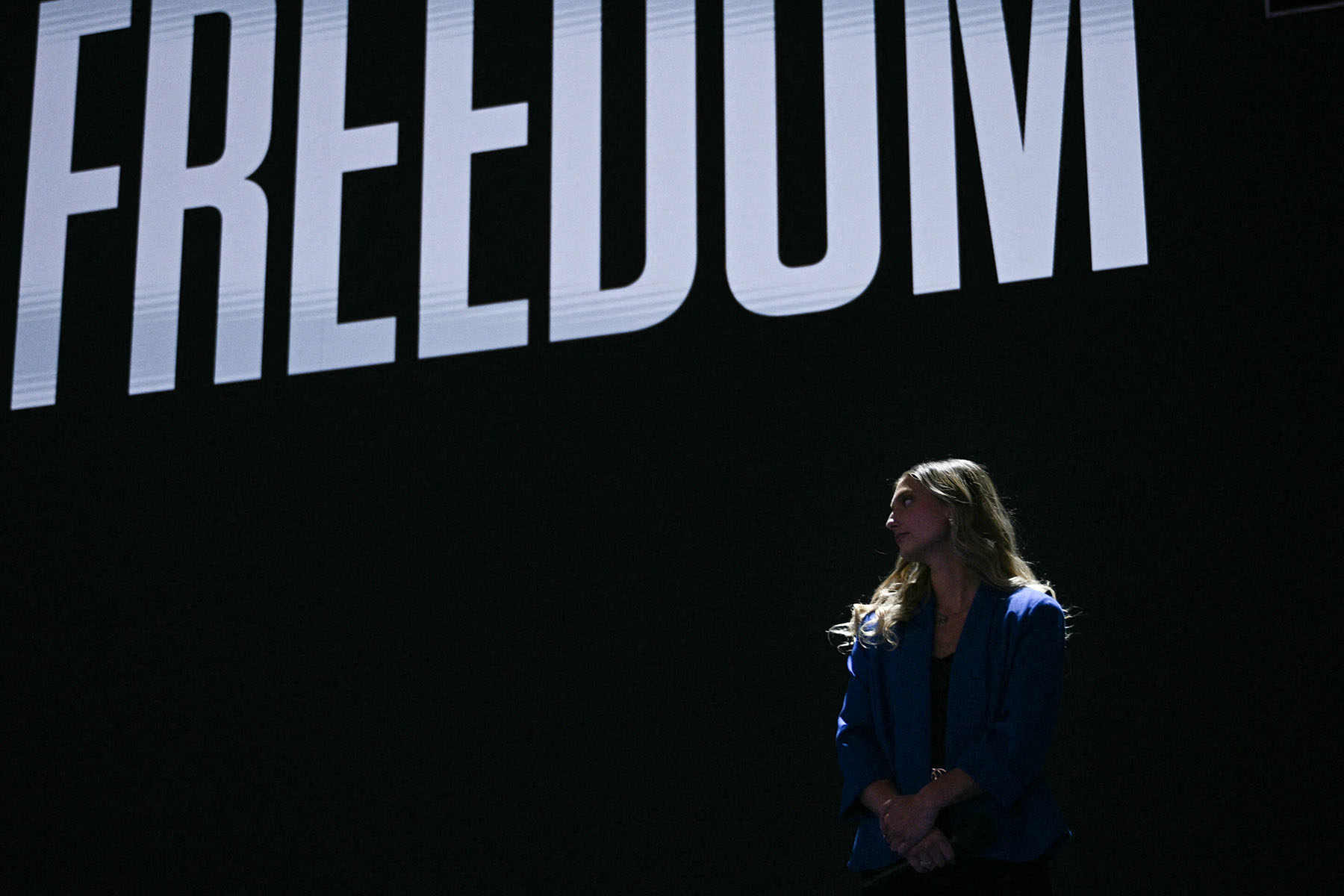Your trusted source for contextualizing Election 2024 news. Sign up for our daily newsletter.
CHICAGO — On Monday, three women and one man shared their stories of abortion, pregnancy and miscarriage, and the protections they had lost when Roe v. Wade fell.
The next night, Kate Cox, who sued the state of Texas last year when she could not qualify for an abortion, cast one of her state’s votes in the ceremonial nomination of Kamala Harris.
On Wednesday, Mini Timmaraju, who runs the advocacy group Reproductive Freedom for All (formerly known as NARAL), as well as former Planned Parenthood leader Cecile Richards and its current president, Alexis McGill Johnson, representing the organization’s political arm, took to the stage and talked about abortion as a matter of freedom.
“When women are free to make their own decisions about their lives and to follow our dreams, we are unstoppable,” Richards said.

When Vice President Harris formally accepts her party’s presidential nomination Thursday night, abortion — a regular focus of her stump speech — is likely to once again take center stage.
Even off the stage at Chicago’s United Center, the Democratic Party’s national gathering — its first since the Supreme Court overturned Roe v. Wade — has been dominated by talk of reproductive rights, from state party meetings to panels focused on the issue. The volume underscores how central abortion has become for Democrats in the post-Roe landscape, and how the party is counting on its power to mobilize voters as it heads into the final 10 weeks of the election.
It flipped the script on past political conventions, when Republicans frequently featured anti-abortion speakers and Democrats remained largely silent on the issue in prime time. Democrats’ focus on abortion only began to emerge in 2016, after nominating Hillary Clinton as the first woman at the top of their ticket in 2016 and calling for the repeal of a decades-old anti-abortion policy in their official party platform. This year, Democrats’ emphasis comes as Republicans are newly silent on reproductive rights — the word did not come up in primetime events at the party’s July convention — reflecting how the GOP’s anti-abortion stance has become a political liability.
At the Democrats’ mostly virtual convention in 2020, in which the party nominated President Joe Biden, the issue barely registered. The case that would overturn Roe hadn’t yet come before the Supreme Court, and Biden has historically been reluctant to discuss abortion, which many attribute to his Catholic faith. Now the word “abortion” is everywhere: in prime-time programming, in events surrounding the convention, and on an array of merchandise and branding.
“It’s been a real journey to be a part of this organization and see how the party has understood its assignment in this moment,” McGill Johnson said in an interview Monday.
Reproductive health has featured at previous conventions: Richards spoke at the 2012 party gathering, though she did not explicitly mention abortion, as did a woman who received endometriosis care at a Planned Parenthood clinic. The 2016 convention featured remarks from Richards and Ilyse Hogue, at the time head of NARAL, sharing her own abortion story.
The shift to explicitly focusing on this issue night after night, and daily at smaller party gatherings, is a direct result of how Roe’s overturn has scrambled abortion politics. And it suggests that even beyond Harris, who has emphasized abortion on the campaign trail, Democrats up and down the ballot are prepared to highlight reproductive rights in their election bids.
“Democrats have been really uncomfortable with this issue for a very long time — far too long. And organizations like ours, Planned Parenthood, formerly NARAL, all the organizations you’re hearing from, but particularly the reproductive justice organizations, have been fighting and pushing,” Timmaraju, who also advised Clinton on her 2016 campaign, told The 19th ahead of her scheduled address.
Abortion opponents have commented on the party’s heightened emphasis. SBA Pro-Life America, an influential anti-abortion group, noted that the Democratic Party platform, ratified Monday night, mentioned the word “abortion” 13 times, compared with a handful of references in the party’s 2020 platform. The group argued that it suggested Democrats have become more extreme on the issue.
“The party that called for abortions to be ‘safe, legal and rare’ is long gone – left in the dust by the ‘Shout Your Abortion Party’ of Harris and Walz,” Marjorie Dannenfelser, the organization’s president, said in a statement. (“Safe, legal and rare” is a framing Democrats embraced in the 1990s under then-President Bill Clinton, who is also set to speak Wednesday night.)
Most voters, including 70 percent of women of reproductive age, say they agree with Democrats’ campaign pitch to pass federal legislation explicitly protecting the right to an abortion. Polling shows that women voters, including almost half of all Republican women of reproductive age, oppose the GOP’s suggested policies — national restrictions on the procedure or leaving abortion up to individual states.
“It has been wild seeing the increase of talk about abortion, and I mean that in the most positive way,” said Calla Halle, who runs an abortion clinic network in North Carolina and Georgia, two states where polling shows Democrats are newly competitive. “There’s a lot of potential for positive change because of the fact that they’re talking about it this much.”
Abortion has also been a focus at smaller party gatherings throughout the week, including during a meeting of the Democratic Women’s Caucus, a panel that featured Gov. JB Pritzker of Illinois, and a roundtable of women governors hosted by actress Julia Louis-Dreyfus.
At that event roundtable, Gov. Kathy Hochul of New York told a story about the day the Supreme Court overturned Roe v. Wade, when she went to a vigil in Prospect Park in Brooklyn and comforted distraught young women.
“It broke my heart to know that something that my mother’s generation fought for, I certainly took for granted, that for my daughter Katie’s generation that was lost,” Hochul said. “And I’m going to fight like hell to get it back to my little granddaughter. “
State legislators, too, have credited their stances on abortion — and voters’ alignment with them — for allowing them to hold onto contested seats, and in some cases make gains.
“We have to continue to animate and amplify on that issue,” said Don Scott, speaker of the Virginia House of Delegates, where Democrats attribute their recent success to voter distaste for a proposed 15-week ban touted by Republican Gov. Glenn Youngkin. “I think we’ll make a mistake if we don’t continue to talk about reproductive health care.”
Lawmakers and party activists have argued that the abortion conversation is a broader one about freedom, a theme Harris has repeatedly invoked while campaigning. At a panel with McGill Johnson, Moms Demand Action executive director Angela Ferrell-Zabala and Michigan Gov. Gretchen Whitmer, McGill Johnson argued that highlighting abortion — especially in the context of elections — is about anchoring a value system around freedom.
“We are having this radical. realignment around freedom — rebuilding and reimagining from an human perspective,” McGill Johnson said. “What happens when you put freedom at the center of your life.”
In another change, abortion patients like Cox and Amanda Zurawski, one of Monday night’s speakers, are now becoming some of the nation’s most visible abortion rights advocates. They’re carrying on a fight forged by Texan women like Richards, the longtime former Planned Parenthood leader and daughter of the former Texas governor, who stood behind Cox during the roll call.
“That was incredible. I mean, what a pillar of a woman, force of nature,” Cox said. “I couldn’t be more grateful to be up there by her side. I think it came together because we’ve got a great state and we’re fighting to make it a little bit better.”
Cox and Zurawski spoke to The 19th aboard a bus that the abortion rights group Free & Just has been driving on a tour spanning eight states and nearly 9,000 miles that began after the Republican convention in Milwaukee and ended in Chicago.
Zurawski said the energy and enthusiasm on the tour has carried over to Democrats’ convention — and drawn a clear contrast with the Republican Party’s anti-abortion stance.
“I think you’re seeing it as such a huge issue reflected in the Democratic Party, because that’s how important it is to voters,” she said.
To check your voter registration status or to get more information about registering to vote, text 19thnews to 26797.




